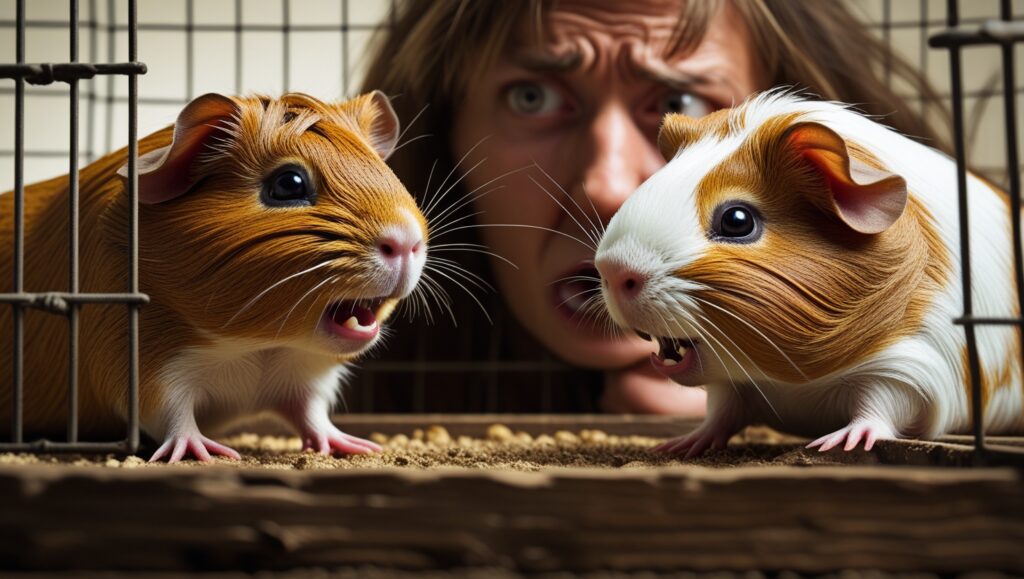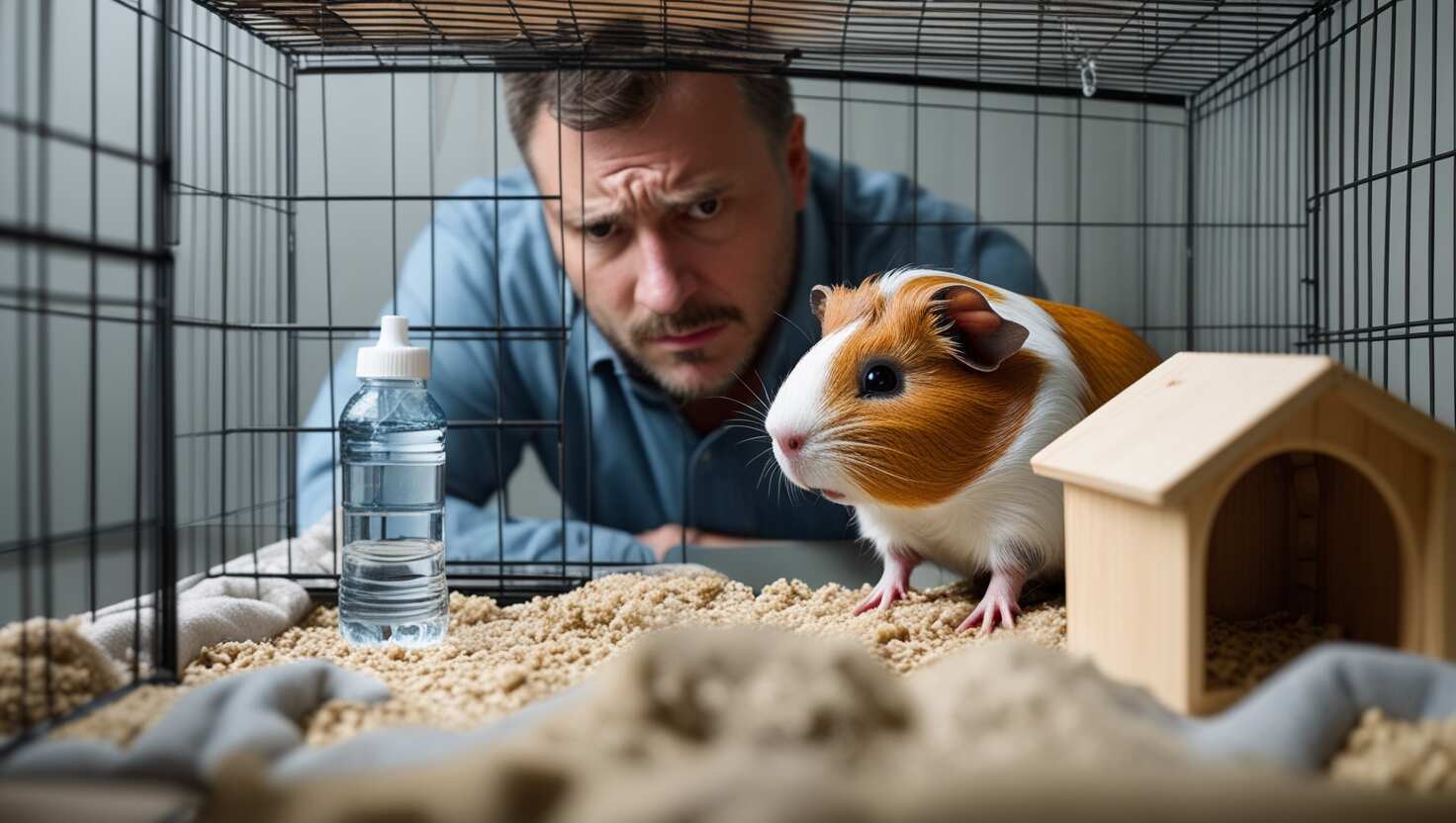Is Your Guinea Pig Unhappy? Warning Signs, Causes, and Easy Fixes for a Happy, Thriving Pet!
Unhappy guinea pig? Watch for warning signs like chewing, hiding, or distressed squeaks. A lack of activity or changes in appetite can signal stress or illness. Ensure their happiness with a balanced diet, social interaction, and a spacious, enriched environment. A thriving guinea pig is an active, engaged, and well-cared-for companion!”

Guinea pigs are expressive creatures that use noises, sounds, and behavior to convey their emotions. If your pet seems unhappy, they may stop interacting, avoid handling, or make distressed noises instead of their usual cheerful ones. A sudden plunge in activity or loss of appetite can signal something is wrong. Every guinea pig has a special personality, so it’s important to learn their habits and understand their needs. Providing proper care and attention can help fix the problem, as their happiness requires a safe and loving environment that meets their different needs.
Signs Your Guinea Pig May Be Stressed or Uncomfortable
Watch for these common behaviors that may indicate a guinea pig is unhappy with its environment, showing signs of stress or discomfort in your pet:
Signs of Destructive Behavior:
If your guinea pig starts biting, chewing, or nibbling excessively on their cage, coroplast, or even their fleece bedding, it may be a sign of destructive behavior. While piggies are naturally curious and love to explore, a guinea pig unhappy with its environment may engage in constant picking at its surroundings due to boredom, stress, or unmet needs. It’s important to assess the cause by checking their environment, playtime, and social interactions. Providing enrichment and enough space can help reduce this excessive behavior and keep your pet happy.
Change in Activity Levels:
Guinea pigs are naturally active animals, often seen scurrying, munching on hay, or running around their cage. If your piggies suddenly show changes in their activity levels, such as taking too many naps, having long periods of downtime, or losing interest in things they usually enjoy, it could be a sign of stress or illness. Keeping an eye on their personality and behavior is important, and if the sudden shift continues, it’s best to bring them to a vet for a check-up.
Guinea Pig Sounds:
Guinea pigs use noise and sounds to communicate their feelings, and certain distinct noises can signal that a piggy is unhappy. A shriek is a sudden and loud cry that often means fear or pain, while teeth chattering is a warning sound that they feel threatened. A deep rumbling may indicate discomfort or irritation, so it’s important to listen and notice these signs. Learning their language and providing plenty of care can help make them feel safe and happy again.
Guinea Pig Fights:
Guinea pigs can have disagreements that may start with light squabbling but can quickly escalate into serious fights. A guinea pig unhappy with its companion may show signs of aggression, including chasing, loud noises, and attempts to bite or leave scratches.

It’s crucial to understand their behavior, especially when introducing a newfound companion, as territorial disputes can turn nasty. If they frequently show signs of tension, separating them early can prevent them from getting injured.
Chirping, Hissing, and Strutting: What They Mean:
When guinea pigs start chirping, hissing, or strutting, they are showing important behaviors that reflect their mood. Chirping is unusual and can be a warning sign of stress or confusion, while hissing means they are upset and trying to warn others to stay away. Strutting is a territorial act, often seen when they feel the need to intrude on another’s space or assert dominance. If you listen carefully and notice these signs, it’s a bet that your pet is feeling uneasy and may need a calmer environment to feel secure.
Biting, Nipping, or Bucking: Signs of Unhappiness:
When a guinea pig starts biting, nipping, or bucking, it’s usually a sign of dominance, especially in males reaching sexual maturity. This behavior occurs when they feel the need to assert control over their space or companions. Some may seem snippy or even mean, but they are simply expressing discomfort. A guinea pig unhappy with its environment may show increased aggression, making it essential to observe their surroundings and interactions. With time and love, you can help them feel more secure and reduce aggressive actions.
Chuttering and Chattering
If your guinea pig is chuttering or chattering, it’s using vocalization to express its feelings. These sharp sounds are usually a warning, telling others to stay away or back off. The noise comes from their teeth clicking together, often accompanied by a stiff posture, showing they feel stressed or annoyed. A cavy that makes these noises is likely bothered by something in its environment, whether it’s another guinea pig or an uncomfortable situation.
As a pet parent, it’s important to pay attention to these cues and understand what’s bothering them. If your guinea pig frequently makes these noises, assess their surroundings and ensure they feel safe and secure. Sometimes, creating a calmer space and giving them time to trust you can reduce this expressive and aggressive behavior. Listening to their vocalization helps you build a stronger trust with your pet while creating a stress-free home.
Six Key Factors That Directly Impact Your Guinea Pig’s Happiness:

Your guinea pig’s well-being depends on these essential areas:






By focusing on these factors, you can ensure your guinea pig stays happy and healthy!
Your Guinea Pig’s Diet: A Sign of Their Well-being
A guinea pig gets excited when they hear the fridge door being opened, the crinkly bag of food rustling, or a box of hay being shaken. Their loud wheeks create a cheerful symphony, showing their eagerness for food. As a caring parent, providing a balanced diet is crucial for their heart health and stomach comfort. The sound of happy crunches, as they enjoy their fresh veggies and hay, is a great way to know they are content and well-fed.
Here are some things to remember:
Fresh Vegetables: Keeping Your Guinea Pig Healthy
Guinea pigs need vegetables every daily to stay healthy, as they cannot produce vitamin C on their own. A comprehensive diet should include fresh, washed veggies in the right condition to keep them safe. Make sure to remove any rotten, cold, or wet pieces, as these can cause bloating and stomach problems. To ensure their food is safe, always check for debris and contamination before serving, and avoid giving them anything unsafe that might upset their stomach.
To maintain their health, offer approximately the right serving size of mixed produce while keeping their space free from old scraps. A proper care pack with the right greens can provide all the essential nutrients they need. Feeding them a variety of safe veggies regularly will not only improve their well-being but also keep them happy and energetic.
Hay: The Key to a Healthy Guinea Pig
Hay is the most essential part of a guinea pig’s diet, making up 80% of their daily food. Providing unlimited access to good quality hay, such as meadow hay, ensures proper digestion and healthy teeth.
The best types of hay should be fresh, slightly green, and free from excessive dry or yellow patches. Always remove debris to keep it clean and safe. This article offers important information on choosing the right hay to support your pet’s health.
Water: Keeping Your Guinea Pig Hydrated
Guinea pigs need fresh, clean water at all times to stay hydrated. Whether using a bowl or a bottle, make sure drinking water is always available and changed daily. In warmer temperatures, they can become dehydrated quickly, so checking their supply often is important. Some may drink only a little at a time, while others drink more, but ensuring they have enough helps keep them healthy and happy.
Pellets: A Small but Important Part of the Diet
Guinea pigs should be fed high-quality pellets every day in small amounts. The recommended serving is about one tablespoon per piggy to avoid health issues like diabetes and obesity. Choose fresh pellets that contain essential nutrients but have little added sugar or fillers like grain and cereal, as these increase the risk of weight gain. Providing the right balance keeps your pet healthy and energetic.
Your Guinea Pig’s Environment: Creating a Stress-Free Space
A guinea pig’s environment plays a big role in their happiness. A quiet, calm cage with safe surroundings helps them feel secure, while loud noises and sudden movements can make them startled, stressed, or uncomfortable. Being cautious of potential triggers, like a new pet or an unsafe place, ensures they feel free and relaxed in their home. Providing the right space helps them stay happy and active.

Here are some simple ways to make your guinea pig’s space more comfortable:
- Guinea pigs need the quietest room in the home to feel secure and stress-free.
- Loud television, radio, or noisy children can cause anxiety, so encourage an inside voice and lower the volume around their cage.
- Keeping them in an indoor space with plenty of hiding spaces, like hideys or wooden hideouts, helps them stay comfortable.
- Avoid placing their cage near a door, as sudden movements can make them feel like a predator is nearby.
- If they stand alert or try to run, it’s a sign they don’t feel safe.
- Providing the right setup prevents the mistake of an unsafe environment and keeps your piggies happy.
Monitoring Your Guinea Pig’s Health
Guinea pigs naturally hide signs of illness as a defence mechanism, making it harder for pet parents to spot problems early. In the wild, they stay vulnerable if they appear weak, so even when sick, they may act normal. Watch for warning signs like lethargic behavior, loss of interest in food or toys, and avoiding their cage mates. A guinea pig that suddenly becomes irritable, withdrawn, or starts hiding more often could be signaling they need help.
A healthy, happy guinea pig is active, playful, and enjoys interacting. If your piggies seem disinterested, stop eating, or show changes in their behaviour, seek help from a cavy-savvy vet. Regular health checks are key for preventing major issues and ensuring their health stays in top condition. Paying close attention to small changes can make all the difference in keeping them safe and well.
Your Guinea Pig’s Living Space: Why Size Matters
Guinea pigs need a living space that is large enough for them to run, stretch, and get proper exercise. Keeping them in cramped cages is unsuitable and can cause stress and boredom. Experts recommend a minimum of 8 square feet of flat living space for two guinea pigs, as this allows them to move freely and stay active. Kavee’s C&C cages and other well-designed indoor cages offer plenty of space, ensuring your piggies stay happy and healthy.
A spacious living space allows guinea pigs to zoom around and even popcorn when they are excited. They can reach speeds of 9.6 kilometers per hour (that’s approximately 6 miles per hour), so having a flat area to run is important. Multi-storied setups can be fun, but they still need a large base to move around comfortably. Many pet owners realise through reading a blog or doing research that proper cage types make a big difference in their pet’s happiness. Offering a large, safe space will ensure your guinea pigs LOVE their home and truly enjoy their environment.
Keeping Your Guinea Pig Happy with Enrichment
Guinea pigs are intelligent animals that need stimulation to stay happy and active. A piggy that lacks enrichment may show negative behaviours, such as chewing their cage bars or becoming withdrawn. Providing toys like willow balls and fleece tunnels keeps them busy and helps boost their confidence. Letting them explore a safe garden encourages natural exploring and running, preventing boredom. Without proper activities, they may develop health issues like obesity and diabetes, which can affect their mood and well-being.
To keep your guinea pigs stimulated, offer a variety of boredom busters to keep them engaged. Reinforce their curiosity with tunnels, safe chews, and new spaces to discover. Creating a playful environment turns everyday life into an adventure, making them feel happy and secure. Interacting with them regularly not only strengthens your bond but also keeps them healthy both physically and mentally.
Your Guinea Pig and Companionship
Loneliness
Guinea pigs are social creatures that feel their happiest when they have a companion. A singleton guinea pig can suffer from loneliness, which may negatively impact their health, leading to low-mood, lethargy, and a decreased appetite. A lack of physical activity can also cause weight gain and other behaviour issues. If your piggies seem skittish, withdrawn, or show changes after a loss, they may be struggling emotionally. Lonely guinea pigs can also develop signs of illness due to stress, making it crucial to watch their habits closely.
Signs of Loneliness in Guinea Pigs:
- Loss of interest in food or reduced appetite
- Feeling tired or lacking energy
- Showing signs of sadness or dullness
- Less movement and reduced activity
- Changes in behavior, including restlessness
- Increased nervousness or jumpiness
In some cases, a guinea pig experiencing pregnancy without a bonded mate can become even more anxious and stressed, needing extra comfort and care. To prevent distressing isolation, consider finding a furry friend through a rescue or matchmaking service. Many local shelters offer bonding sessions to help guinea pigs match with the right companion.
Proper introductions following the standard method are essential to avoid fights and ensure a strong bond. If you are unsure about the process, speak to an expert for guidance. Visiting a shelter and choosing the easiest match can improve their well-being, helping them stay active, playful, and emotionally balanced.
Incorrect Bond
When guinea pigs have an incorrect bond, their happiness is affected, leading to constant fighting and aggressive behaviour. A poor pairing disrupts the herd dynamic, causing chasing, circling, and even raised tension between piggies. If one or both are persistently facing off or pushing their noses together in an aggressive way, it’s a clear red flag.
While occasional disagreement is normal, a persistent, broken relationship may mean the pair is unbalanced. Ruled out health issues first, then consider different bonding strategies. Some furry friends may never get along, and in such cases, finding a better pair through a blog or expert advice is best.
Why Isn’t My Guinea Pig Happy?
If your guinea pig is displaying unusual behaviors, it may be due to environmental factors that negatively affect their mood. A guinea pig unhappy with its surroundings may become stressed if its space is too small, it feels lonely, or its diet lacks essential nutrients.

If you have noticed changes in your piggy, it’s important to understand what they need and how to positively impact their well-being. Knowing what makes them comfortable will help ensure they stay happy and healthy.
No Guinea Pig Playmates
Guinea pigs are social creatures that thrive with playmates of their own kind. While human company is important, it suffices only to a certain extent, as they naturally relate better to another guinea pig. A piggy kept alone may become depressed and struggle with bonding, leading to a guinea pig being unhappy in its environment. It’s always best to pair them with the same sex unless properly introduced. If you have one guinea pig, consider finding them a friend to keep them happy and active.
Incorrect Diet
A proper diet is essential for guinea pigs to stay healthy and active. A lack of vitamin C in their food can lead to scurvy, a serious deficiency that causes pain and weakness. Poor nutrition can also cause other health issues, including weight loss, digestive problems, and even depression. Always focus on buying fresh, nutrient-rich foods to avoid unwanted risks. A balanced diet with hay, fresh veggies, and fortified pellets helps draw out their best energy and keeps them happy.
Scared of Owners
Guinea pigs are prey animals, so they can be naturally scared and skittish around their owners, especially in unfamiliar environments. If they run away, freeze, or avoid interaction, it could be due to fear, over-stimulation, or a weak bond. It is crucial to handle them regularly in a gentle way to help them feel safe and socialized. If this is happening often, ensure they have enough quiet time, a predictable routine, and a stress-free space to build trust and improve their behavior.
Not Enough Exercise
If your piggy isn’t getting enough exercise, they may become skittish, sluggish, and seem in the dumps. Play and interaction are vital for their happiness, helping them stay active and strengthen their bond with you. A guinea pig that avoids movement or refuses to mingle with others might be falling behind in health. Often, lack of activity can lead to weight gain and developing boredom. To prevent this, enforce daily playtime and ensure they have space to run and explore, avoiding constant inactivity.
Conclusion
Ensuring your guinea pigs are happy, healthy, and entertained requires understanding their behaviors and creating a spacious, comfortable environment that supports their natural lifestyles. A bright-eyed, bushy-tailed piggy is a sign of well-being, but if your guinea pig is unhappy, you may notice signs like territorial aggression, lethargy, or appetite loss, which can indicate stress or discomfort.
Providing proper companionship, a balanced diet, and regular exercise can boost their mood and prevent negative behaviors. A clean home with engaging enrichment and a stress-free environment ensures they remain active and feel secure. By following this guide and making thoughtful adjustments, you can identify potential issues early and help your piggies live a happy, thriving life.
Kindly note: The content shared in this blog is gathered from online sources, some of which may not be verified. For accurate guidance on caring for your guinea pig, it is recommended to seek advice from a qualified veterinarian.

